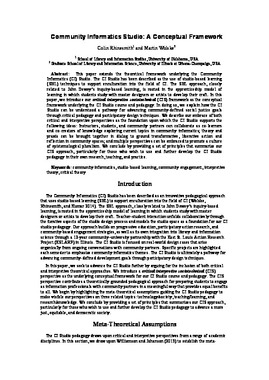| dc.contributor.author | Rhinesmith, Colin | |
| dc.contributor.author | Wolske, Martin | |
| dc.date.accessioned | 2014-11-26T16:47:16Z | |
| dc.date.accessioned | 2016-03-30T15:34:45Z | |
| dc.date.available | 2014-11-26T16:47:16Z | |
| dc.date.available | 2016-03-30T15:34:45Z | |
| dc.date.issued | 2014 | |
| dc.identifier.citation | Rhinesmith, C. and Wolske, M. (2014, December). Community Informatics Studio: A Conceptual Framework. In: Stillman, L. and Denison, T. (Eds.), Conference Proceedings - CIRN Community Informatics Conference "Challenges and Solutions": 13-15 October, Monash Centre Prato, Italy: Centre for Community and Social Informatics, Faculty of IT, Monash University. | en_US |
| dc.identifier.uri | https://hdl.handle.net/11244/13631 | |
| dc.description.abstract | This paper extends the theoretical framework underlying the Community Informatics (CI) Studio. The CI Studio has been described as the use of studio-based learning (SBL) techniques to support enculturation into the field of CI. The SBL approach, closely related to John Dewey’s inquiry-based learning, is rooted in the apprenticeship model of learning in which students study with master designers or artists to develop their craft. In this paper, we introduce our critical interpretive sociotechnical (CIS) framework as the conceptual framework underlying the CI Studio course and pedagogy. In doing so, we explain how the CI Studio can be understood a pathway for advancing community-defined social justice goals through critical pedagogy and participatory design techniques. We describe our embrace of both critical and interpretive perspectives as the foundation upon which the CI Studio supports the following ideas: Instructors, students, and community partners can collaborate as co-learners and co-creators of knowledge exploring current topics in community informatics; theory and praxis can be brought together in dialog to ground transformative, liberative action and reflection in community spaces; and multiple perspectives can be embraced to promote a culture of epistemological pluralism. We conclude by providing a set of principles that summarize our CIS approach, particularly for those who wish to use and further develop the CI Studio pedagogy in their own research, teaching, and practice. | en_US |
| dc.language | en_US | en_US |
| dc.subject | community informatics | en_US |
| dc.subject | studio-based learning | en_US |
| dc.subject | community engagement | en_US |
| dc.subject | interpretive theory | en_US |
| dc.subject | critical theory | en_US |
| dc.title | Community Informatics Studio: A Conceptual Framework | en_US |
| dc.type | Preprint | en_US |
| dc.description.peerreview | Yes | en_US |
| dc.description.peerreviewnotes | Refereed Conference Proceeding | en_US |
